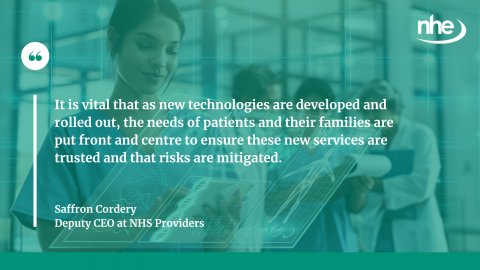New polling from the Health Foundation shows that, while there is concrete support for artificial intelligence (AI) in the NHS, there are still some issues that need to be addressed before the health and care sector can make serious progress with its adoption of AI.
To better understand both public and NHS attitudes surrounding AI, the think tank surveyed 7,201 members of the public and 1,292 health service staff.
They found that:
- more than half (54%) of the public support the use of AI in patient care;
- three in four (76%) NHS staff support the use of AI in patient care;
- three in five (61%) members of the public support the use of AI for administration; and
- four in five (81%) NHS staff support the use of AI for administration.
Despite the widespread support, nearly one in five (18%) members of the public think AI will detrimentally impact care quality. Those aged between 16-24 are less likely to believe AI will improve care; women are also less likely than men.
One of the main areas of concern is the possibility that AI could foster a disconnect between patients and NHS staff — more than half (53%) of the public are worried about this, while two-thirds (65%) of NHS staff echo this sentiment.
Another worry is the potential for inaccuracies to slip through the cracks if AI technology is trusted too much — the public are strong in their support for AI if it is supervised by humans. Three in 10 (30%) members of the public believe the primary disadvantage of AI is healthcare professionals not questioning its outputs.

“This data shows NHS staff support for the role AI could play in healthcare and in helping them to do their jobs,” said NHS Providers’ deputy CEO, Saffron Cordery, responding to the news. “But there is also scepticism and concern amongst some patients and staff about the impact on care quality, the accuracy of decision making by AI and worries that care could become less personal.”
She added: “It is vital that as new technologies are developed and rolled out, the needs of patients and their families are put front and centre to ensure these new services are trusted and that risks are mitigated.”
The Health Foundation research also shows that feelings for AI are not consistent across NHS professions. While, overall, most (57%) staff are looking forward to using AI as part of their role, medical and dental staff are more positive than certain clinical staff such as health care assistants and health care support workers, for example.
Ultimately, the Health Foundation says that progress can be made if:
- AI technologies can be designed and implemented in ways that support human interaction rather than take it away;
- regulation, training and public engagement address concerns around decision-making accuracy and transparency; and
- there is recognition about the way AI will impact different professions and engagement is tailored accordingly.
Cordery added that, while AI has massive potential, it is important that advances in the technology do not come at the expense of investment in core digital and IT infrastructure, or in workforce training and development.
Image credit: iStock



















